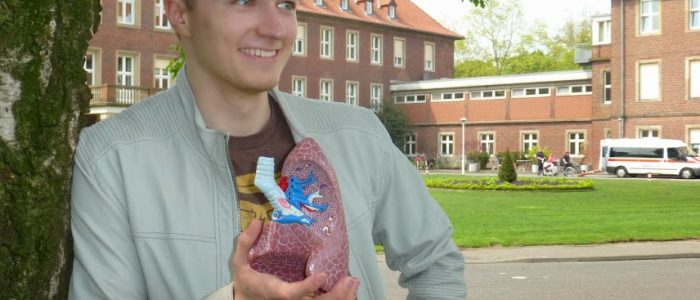Interview with Thorben Royeck, Supervisor of EaT Münster, Germany
How do you combine outstanding commitment with excellent results in your studies?
When medical student Thorben Royeck (21) made the decision to form a local group at the Faculty of Medicine in Münster a few months ago, he faced many challenges. Now his EAT group has around 60 members. To find out more about Thorben’s motivation, his first steps and plans, I sat down to interview him.
Thorben, why are you involved in the project?
‘Young people are easily influenced by their social circle and emotive advertising. When all their friends smoke, or there are adverts at every bus stop and nuanced information about the topic is lacking, then they’re almost hard-wired to take their first steps on the road to addiction. I hope that by imparting my knowledge I can counteract these influences and give students the opportunity to make their own independent decision about tobacco consumption.’
What do you see as the biggest challenges?
‘So far, the biggest challenge has been to set up the project in Münster and to get us into a good starting position to establish the project in the long term, as is our aim. Thanks to successful teamwork and the support of our faculty, I think that we’ve succeeded in doing that. EAT Münster has been supported by the Dean’s office at the Faculty of Medicine in Münster, both financially and in terms of ideas, since April. We can now make a start with confidence over the next few months and teach as many school children as possible.’
How did your friends and acquaintances respond to the start of your group?
‘Up until now, I’ve only received positive feedback about the project. Classmates and lecturers, to whom we’ve presented the project so far, share our view that EAT can really set something in motion. Presenting the project to the Dean of Studies was equally encouraging. The firm support from the Faculty, right from the start, shows that the project has been well received, but also that there are certain expectations of it. I am now responsible for fulfilling those expectations with our work over the next few weeks.’
Alongside your involvement in the project, you’re also getting very good grades in your studies. How is that possible?
‘Obviously the organization of a project like this, particularly when you’re just setting it up, takes up quite a lot of your time. But I am also very willing to invest time in this project, because I believe that EAT can really do something. This education program is in that sense a way of enriching of my studies. In addition, there’s a huge amount of teamwork involved in EAT. We’re always sharing the workload. At this point, I must thank my coordinators Julius Sander, Charlotte Mittmann, Lukas Bergerhausen and Stefan Kahnert, without whose support the founding of the project in this way would not have been as successful thus far.’
What are the long term plans in Münster?
‘So that as many children as possible can benefit from the project, we’re going to do our best to integrate the project into the Faculty’s curriculum in the long term. That way it’ll be easier to grow, but we’re also ensuring longevity.
More about the Münster group: http://gegentabak.de/universitaet-muenster/

